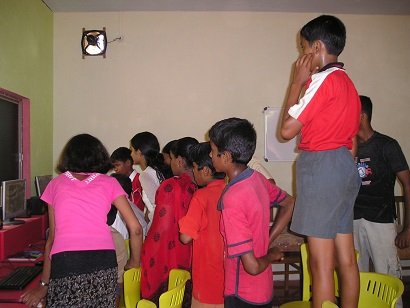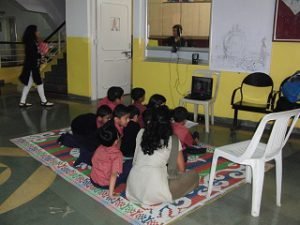One of my favourite bits about being a key member of the Granny Cloud team is the opportunity I get to interact, not just with the children and coordinators at all the locations, but the one-on-one chats I have with Grannies spread across the world.
As we edge towards a decade of existence and long-term interaction in several of the locations (we have been in some centres continuously for 5 years and have Grannies on the team who have been around not just 5 years, but close to the entire duration of the initiative), we face a question that pops up in many different conversations. It is a question that has many facets. It is a question that encourages reflection about how long the Granny Cloud should continue to interact or be available to a specific location / centre / site? And the question has several sub-questions embedded in it… How long should a Granny continue to interact with a specific group? At what point do the benefits of that interaction plateau out? At what point does ‘complacency’ creep in? And when does the interaction begin to be taken for granted? At what point do Grannies begin to feel ‘burnt out’, frustrated or too demoralized to continue?
Nothing is ever static. Nor is the set of conditions exactly the same for each Granny and Centre. Yet given the number of children across many locations who would love to have Grannies and are waiting to become part of the Granny Cloud community, these are questions that have to be asked. Again, and again, and again. And we have to factor in the very important element of the Granny Cloud comprising of ALL VOLUNTEERS. How much, and what, can we realistically take on? Where do we want to use our limited resources? To what end? And so it goes…
I doubt that any of us will ever have any completely satisfying answers to these questions. The discussion will (and should) remain permanently open, and I am glad it is this way. The best we can do is come to decisions based on the ‘present’. Along the way, we have come across a few pointers to help us decide. For ourselves, as individual grannies, and for the centres we choose to interact with.
Some centres / labs fall by the wayside of their own volition. Quite often, not even as a thought through, and deliberately arrived at, decision – but as a gradually dwindling number of sessions that take place. This has been the case with many centres, including several of the original Hyderabad SOLE labs that had initially indicated wanting to continue even after the OGEF project (and the related funding) came to an end in December 2009. The reasons are many – no outside funding, and the related absence of field visits from the Granny Cloud, the lack of ‘ownership of the idea’, a lack of comprehension about the ethos and purpose of the Granny Cloud, and the absence of a regularly available technician to ensure that the equipment was in working condition. After all, we didn’t see or set ourselves up as substituting the teachers and have no intention of doing that even now.
But there have been other reasons too, even in locations that came on board with self funding from the very beginning. The unavailability of a coordinator / facilitator at the lab / centre who can communicate with the Grannies – at least to a basic extent, is often a key reason. Another significant (and connected to various other reasons) cause is the challenge posed by ‘connectivity’. Poor and fluctuating signals, low bandwidth, and the consequent erratic interactions combined with, and related to the likelihood of interrupted and incomplete activities are part of this connectivity challenge. And when all of this goes hand in hand with the lack of a common language in which at least a basic discussion / conversation can be had, it is easy to see why many Grannies begin to question whether there is any point in continuing. I am not even getting into the additional challenges posed by time zone differences leading to the unavailability of convenient times for Grannies to attempt sessions, or the lack of Grannies because of the timings at which a specific centre / lab is, or can be, kept open.
Yet, we have crossed many of these challenges in many locations and established an ongoing relationship – even a ‘routine’. A routine that can be comforting and looked forward to as easily by the children, the coordinators, as well as the Grannies. Yet it is this stage that is precarious. Could the ‘comfort level’ be so high that it loses sight of the need to create a challenge? Is the routine so much of a habit that very few new tasks and skills are attempted? Have the children reached a point where the interactions have lost not only the charm of novelty but also the edge created by having to figure out the style, and approach, and interest, and strength of a new Granny, of a new group of children? Remember the excitement of having a new teacher as you moved into another grade at school (or a new group of children if you were a teacher!)? A bit similar!
And what about when Grannies feel that (within the constraints of the situation) they have taken the children as far as they can and could probably offer a lot more to a completely new group of children in the same or different location? And what about when Grannies have successfully taken on some of the most challenging locations for many years, but now have a load of other commitments? So while they still might not want to come to a complete halt, they yearn to interact with children at centres that carry fewer challenges, have lots of support available from the centre end so they can try out something different and carry it all the way through to completion.
All of these are situations when Grannies and centre coordinators need to take a step back and reassess their specific situation. Perhaps it is time to move to another group, another location, perhaps it is time to take a break and return, or perhaps even stop completely knowing that the time spent together was meaningful at both ends…
Nothing is forever. It doesn’t need to be. It will still have made a difference. Do move on. Try something else, somewhere else. Change can be good – all around!




